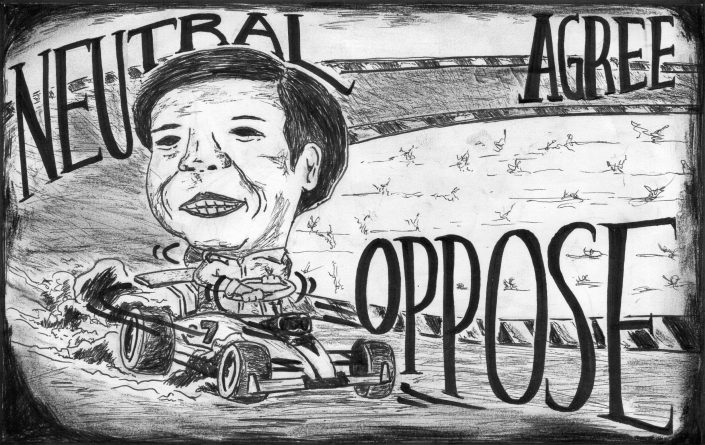Recall presidential candidate Bongbong Marcos’ initial statement on Russia’s attack on Ukraine: he believed that the Philippines did not need to be involved and did not need to take a stance. This prompted his supporters to criticize opposing candidate Vice President Leni Robredo for her statement that would “bring the country to war.” Not long after, however, Marcos Jr. took back his statement—flip-flopping—and said, “I stand united with the rest of the world for Russia to respect Ukraine’s freedom and its citizens’ democratic way of life.”

Unfortunately, Marcos Jr. was not the only one known to have flip-flopped on their stances. Other presidential candidate Manila Mayor Isko Moreno, who has been campaigning against online disinformation, recently formed an alliance with known fake news peddler Mocha Uson, rendering his anti-fake news campaign muddy, especially when he chose to vaguely respond to the issue. These cases are disappointing to say the least, when our current president has been known to have flip-flopped on numerous occasions throughout his term, from relations with China to where his support lies in the upcoming elections. And we all know where that’s brought us.
Let’s look back at our situation in September 2021, when the supposed imposition of a general community quarantine with new alert levels in Metro Manila suddenly shifted to a modified enhanced quarantine. While this was done with merit, the false hope had caused confusion and distraught.
The last-minute change to the policy shook the business sector, especially the owners of micro-, small-, and medium-sized enterprises who were anticipating a chance to recover their losses during the pandemic. The flip-flop wasted businesses’ resources, affected the economy, and further fostered mistrust in the government. After all, this single flip-flop led to a domino effect that caused many to barely put food on their tables, much less worry about their health.
Before public officials are even elected into office, they first need the support of the people. What draws voters to their chosen candidates is often how they are able to relate with and connect to the candidates. When they see a candidate who embodies their beliefs or represents where they come from, there is a trust formed between the voter and their bets.
“Public office is a public trust,” says the 1987 Constitution on the accountability of public officers. But what happens when this trust is broken? Several of our current candidates have been a keen example of the backlash one faces after turning their backs on their supporters. Take senatoriable Samira Gutoc for example; when she was introduced as a strong female leader who represented a minority group in the country, people instantly took to her and nearly carried her all the way to a seat in the Senate. However, her recent statements which sweep the truth of the violence brought about by the war on drugs and her alliance with questionable candidates have caused many of her former supporters to be crestfallen and disappointed.
Another candidate whose change in stances has greatly lessened his supporters is former presidential spokesperson Harry Roque. While it might have been lifetimes ago, the politician now known for dancing at sorties and being a staunch supporter of President Duterte was once an esteemed lawyer who pushed for the protection of the rights to free speech and of freedom of the press. These days, however, Roque has chosen to remain silent on the pressing issues surrounding the government.
Looking at the current roster of candidates running for local and national positions, it’s not rare to see voters disappointed and confused about how their former favorites have now changed their stances and alliances. For politicians who began rallying support by promising to “stand with the people,” they seem to have left them alone.
Such multiple turnarounds of views further signal a candidate’s inability to own up to their stances—a cowardly act that may raise the question of whether or not they are ready for a government seat.
There is nothing wrong with individuals learning more about a topic and making a more educated decision regarding it. However, when one changes their stance without supporting statements, we should be wary of the real reason for the change. While we want leaders who listen to the plight of the people, we also need them to actually understand it so that they may make sound decisions based on the vast information available to them that the public may not be privy to. A president is not expected to simply jump on a bandwagon. We are electing a leader, after all, not a mere people pleaser.
In this regard, if the Philippines were to elect a flip-flopping president once more—or any other official for that matter—then we shall expect leaders who will not be able to stand their ground against pressing issues and give their definite stances on these. Apart from them confusing the people with their incoherence and sudden shifts in views, they will be leaders with no grit and those who may lead our country to its demise instead of recovery.
It is up to our power as Filipino voters to inhibit the possibility of this foolery from unraveling in the next six years by holding these candidates accountable for their words and scrutinizing each of their backgrounds to ensure their sincerity. We cannot afford to end up dismayed just for failing to recognize what’s behind their deceitful masks.
We should strive to know better.
